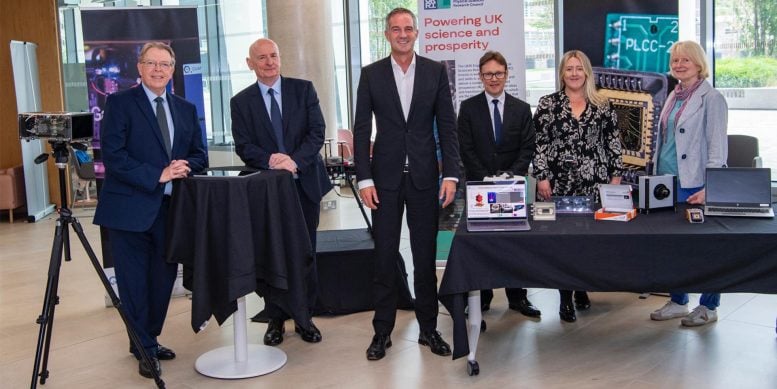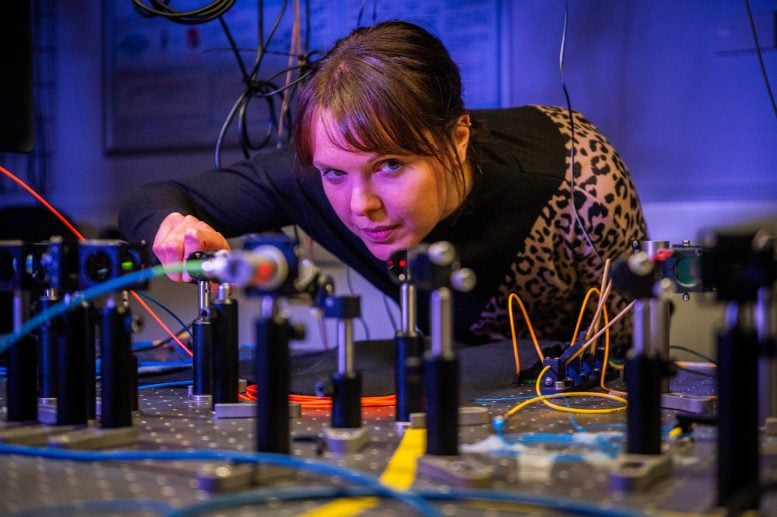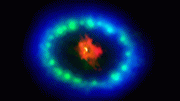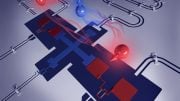Heriot-Watt University heads a new quantum research hub to develop a secure quantum internet and advance technologies across various sectors, fueled by a significant UK government investment.
Heriot-Watt University has been chosen to lead a groundbreaking new quantum research hub that aims to develop technologies to progress an ultra-secure ‘quantum internet’ of the future. The Integrated Quantum Networks (IQN) Hub is one of five new quantum technology hubs announced by the UK government as part of a £160 million investment to ensure the UK remains at the forefront of these revolutionary technologies.
Quantum technology can harness the unique properties of atoms and subatomic particles to achieve functionalities that are not possible with existing, conventional technologies. While complex in nature, the applications of quantum technology are set to revolutionize many aspects of our daily lives.
Professor Gerald Buller, who will lead the IQN Hub at Heriot-Watt, explains: “Think of quantum like a supercharged version of the technology we use today. It allows us to solve problems and secure data in ways that are unimaginable with conventional technology. This could lead to breakthroughs in everything from pharmaceutical research to exciting new materials development.”
Goals of the IQN Hub
The IQN Hub will focus on creating large-scale quantum networks capable of distributing quantum entanglement potentially leading to the development of a secure communications network and therefore an internet free from hacking issues. Another clear motivation for quantum networks is to connect next-generation quantum processors to produce enormous computational power. Furthermore, these quantum networks can eventually be used to connect quantum sensors for ultra-low-noise measurements.
“The Integrated Quantum Networks Hub will deliver the research required towards the establishment of a quantum internet, leading to metropolitan scale demonstrations within the lifetime of the Hub,” said Professor Buller. “The Hub harnesses the excellent research done over the last ten years in the National Quantum Technologies Programme to focus on delivering quantum networks at a range of distance scales, from local networks up to global satellite-based connections.”

Pictured is Quentin Pankhurst (bio hub), Gerald Buller (IQN), Peter Kyle MP, Douglas Paul (PNT), Kirsty Annand (QuantIC/Quantum sensing and timing), Viv Kendon (Q Computing). Credit: Heriot-Watt University
In an era where cybercrime costs the UK an estimated £27 billion annually, the quantum internet promises unprecedented levels of security. Unlike current encryption methods, quantum networks use the principles of quantum mechanics to create unbreakable encryption keys, making them impervious to hacking attempts.
Beyond enhanced security, the quantum internet provides secure connections between quantum computing resources which will revolutionize fields such as healthcare, enabling accelerated drug discovery and personalized treatment plans. It could also drive advancements in artificial intelligence, environmental monitoring, and improved navigation systems.
Heriot-Watt University’s Broad Involvement in Quantum Research
Heriot-Watt’s involvement in quantum research extends beyond the IQN Hub, with the university also playing significant roles in three of the four other newly announced quantum hubs. These include hubs focused on quantum-enabled position, navigation and timing, quantum biomedical sensing, and quantum sensing, imaging, and timing.
Professor Gill Murray, Deputy Principal for Enterprise and Business at Heriot-Watt University, highlighted the broader implications of the announcement: “The launch of five new quantum hubs is a significant milestone for the UK and represents a major shift in data security and cutting-edge applications across all sectors. The UK has established itself as an early pioneer, aligned with the government’s national quantum strategy aiming to become a quantum-enabled economy by 2035. These hubs form a critical piece of that roadmap by tackling key research and development challenges around quantum networking, sensing, computing, and more.
“For Heriot-Watt University specifically, the IQN Hub has several roles to play. It will firstly keep Scotland and the UK at the forefront of quantum technologies, and transform the modern economy and society. Secondly, it’s a notable step forward for the education sector as universities like ours will be at the forefront of developing and upskilling the future workforce working and living in a quantum-enabled future across design, engineering, manufacturing, and the required support services. We also anticipate interest in the IQN Hub to attract talent to the UK from around the world that will drive international partnerships and business opportunities. We are incredibly eager to get stuck in and help develop a robust workforce and supply chain pipeline.”
Industry Collaboration and Future Prospects
The IQN Hub brings together a network of over 40 non-academic collaborators, ranging from startups to multinational corporations, alongside organizations like the National Cyber Security Centre and Scottish Enterprise. It will receive over £20 million in partner support to help translate quantum innovations into new products and services.
The five new quantum hubs are being delivered by the UKRI Engineering and Physical Sciences Research Council (EPSRC), with a £106 million investment from EPSRC, the UKRI Biotechnology and Biological Research Council, UKRI Medical Research Council, and the National Institute for Health and Care Research. Industry collaboration is a key element, with significant cash and in-kind contributions from partners worth more than £54 million.
Partner universities include the Imperial College London; National Physical Laboratory; Queen’s University Belfast; RAL Space STFC; University of Bristol; University of Cambridge; University of Edinburgh; University of Glasgow; University of Oxford; University of Sheffield; University of Southampton; University of Strathclyde; University of Warwick and University of York.
Secretary of State for Science, Innovation and Technology, Peter Kyle, said: “We want to see a future where cutting-edge science improves everyday lives. That is the vision behind our investment in these new quantum technology hubs, by supporting the deployment of technology that will mean faster diagnoses for diseases, critical infrastructure safe from hostile threats, and cleaner energy for us all.
“This isn’t just about research; it’s about putting that research to work. These hubs will bridge the gap between brilliant ideas and practical solutions. They will not only transform sectors like healthcare and security, but also create a culture of accelerated innovation that helps to grow our economy.”
As the UK aims to become a quantum-enabled economy by 2035, these hubs form a critical piece of the national quantum strategy. They are expected to drive entrepreneurship, workforce development, and regulatory input into the rapidly emerging UK quantum industry, potentially sparking significant economic growth and job creation in the coming years.










Be the first to comment on "Groundbreaking New Research Hub Aims To Develop “Near-Unhackable” Quantum Internet"